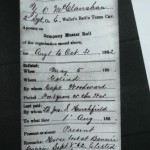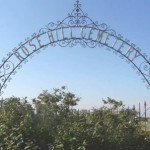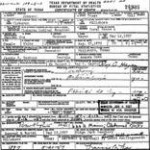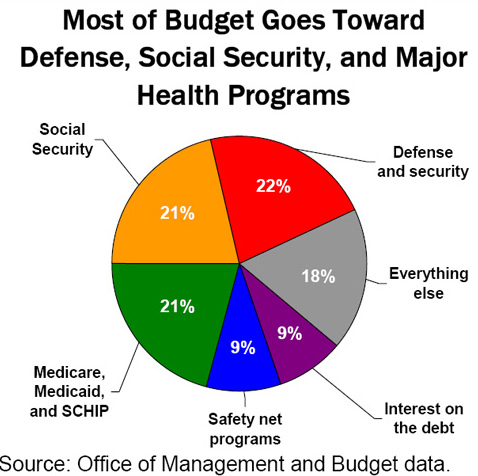Articles
Family Search Adds Millions of New Records in September of 2011
September 30, 2011 by ramona
Filed under Articles, Latest News, Public Records
On September 7, 2011, Family Search once again enriched the genealogy community by adding millions of new records to its database. Included in the new additions are records from the US, Canada, Mexico, England and South Africa. Let us take a little closer look at this new genealogical treasure trove. The majority of the US records focus on Union and Confederate soldiers who served in the American Civil War and include records from Alabama, Arkansas, California, Delaware, Florida, Georgia, Kentucky, Louisiana, Maryland, Mississippi and Missouri.
once again enriched the genealogy community by adding millions of new records to its database. Included in the new additions are records from the US, Canada, Mexico, England and South Africa. Let us take a little closer look at this new genealogical treasure trove. The majority of the US records focus on Union and Confederate soldiers who served in the American Civil War and include records from Alabama, Arkansas, California, Delaware, Florida, Georgia, Kentucky, Louisiana, Maryland, Mississippi and Missouri.
In addition to the Civil War Records, you will also find.
Applications for headstones for military veterans, 1925-1941
This collection contains images of the applications of the Cemetarial Division of the Quartermaster General. Most of these records are for Civil war veterans although a few do cover earlier wars.
Index of passenger arrivals in the gulf ports, 1820-1874
In this set of records, you will find a card index for passengers that arrived in 70 ports along the Atlantic and Gulf Coasts. Sadly, there are none included from New York.
Records of national homes for US disabled volunteer soldiers, 1866-1938
This collection contains a wealth of historical registers for veterans admitted to 12 regional homes. Information in these records include (but are not limited to) Company, regiment, marital status, birthplace, date and cause of death.
Records of confederate prisoners of war, 1861-1865
An incredible 427 images of volumes are contained in this record set from the War Departments office of the Commissary General and the Surgeon Generals office.
Index to the Pension Application Files, for the War of 1812, 1812-1910
A collection containing the soldier’s name, military service information and widow’s name.
Canadian notorial records
Notarial records, distinct to Quebec Canada; are a record of private agreement taken by a notary and are a legal and binding contract. Notary records include marriage contracts, leases, inventories and wills.
Quebec notarial records, 1800-1900
In this collection you will find the records arranged by geographic location, notary and time period.
England miscellaneous records
A collection of records from the Northumberland Archives Service. This miscellaneous assembly includes Parish Registers, Electoral Registers and Nonconformist records.
Mexico
Mexico, Guanajuato, Catholic Church Records, 1576-1984. Marriages and Baptisms from the Catholic Parishes in the state of Guanajuato, Mexico are kept in this collection.
Mexico, México Estado, Civil Registration, 1861-1941. An assortment of Civil registrations, (births, marriages and deaths), from the state of México Edo, Mexico.
South Africa
South Africa, Dutch Reformed Church Registers, 1660-1970. You will find an index and images of marriages and baptisms along with records of membership in the Dutch Reformed Catholic Church. This collection covers the locations, Namibia, Cape of Good Hope province and Transvaal province
The records contained in all collections are being published in full, as images become available.
For more on these new record additions visit Family Search.org
Welcome!
July 12, 2011 by Chris Clegg
Filed under Articles
 Hello there,
Hello there,
Thanks for the visit. My name is Chris Clegg and I’ve been a professional researcher for over 18 years now. I founded Genealogy Beginner because I’ve always been fascinated with the process of discovery. Research is about finding the answers. Working to uncover truths that are not otherwise apparent or immediately available. Genealogy it as a perfect way to expand one’s understanding of research as a practice. A genealogist is really just a researcher of the past. A forensic detective so to speak. Who doesn’t want to be a detective? Especially when “the case” is your own history.
The team at Genealogy Beginner work to develop tools and resources to help you become a detective. We hope you find it helpful.
Drop us a line
and tell me what you think about this, us, the site,
or anything else.
We’d love to hear from you.
To your success,
Duane Allman & Berry Oakley Graves at Rose Hill Cemetery
April 17, 2011 by Chris
Filed under Articles, Cemetery Searches
 I just published a post at my Rose Hill Cemetery; Macon, Georgia blog I think some of you might enjoy. And the Road Goes on Forever: Duane Allman & Berry Oakley is now live.
I just published a post at my Rose Hill Cemetery; Macon, Georgia blog I think some of you might enjoy. And the Road Goes on Forever: Duane Allman & Berry Oakley is now live.
(This posting is from Southern Graves. Click the link to view the full article from its original source.)
Misadventures in Indexing
April 14, 2011 by Chris
Filed under Articles, Genealogy for Beginners, Latest News
 Fine. I admit it. My indexing numbers are nowhere as big as Renee Zamora’s. That’s not to say I don’t find it as meaningful. In fact, my problem is that sometimes I find it too meaningful. Take last week. I made the mistake of taking a batch of Louisiana Death certificates. Soon I was so drawn into these people’s lives, that it took all week to get one batch done. I started on the first certificate. Cause of death? Drowning. How sad. How old was this person? A ten year old boy. Wow; that is sad. Why did someone write “refugee” at the top?
Fine. I admit it. My indexing numbers are nowhere as big as Renee Zamora’s. That’s not to say I don’t find it as meaningful. In fact, my problem is that sometimes I find it too meaningful. Take last week. I made the mistake of taking a batch of Louisiana Death certificates. Soon I was so drawn into these people’s lives, that it took all week to get one batch done. I started on the first certificate. Cause of death? Drowning. How sad. How old was this person? A ten year old boy. Wow; that is sad. Why did someone write “refugee” at the top?
Next certificate. Also said “refugee” at the top. Cause of death? Drowning! Wait a minute. Same name? No, this one was North Hudson’s five year old name sake. Same date? Yes, 8 July 1927. Both in Port Barre, St. Landry Parish. Wow. Opelousas is crossed out and Porte Barre written in. Wonder what happened.
Third and fourth certificates. Also refugees who drowned on 8 July 1927. Both named Hudson. North Hudson was here again, as informant. Does that mean he had to identify the bodies?
Fifth, sixth, seventh. All children of Delphine Thornton, ages 13, 9 and 5. All 8 July 1927 in Port Barre. Oh, my goodness. She lost three children in whatever happened.
What did happen? It didn’t take very long before Google had uncovered the Great Flood of 1927. The Mississippi had overflowed her banks during the spring runoff. Displaced “refugees” were evacuated to neighboring communities.
I’m still unclear of all the goings on, but the flood waters seem to have lasted for months. On 8 July 1927 I think the levee protecting Port Barre failed. It fell to the medical examiner in Opelousas to perform the terrible last reuniting of lost family members. I found myself feeling awkward, standing in the back, an unbidden guest, witnessing this pervasively private moment. Then I thought that perhaps, if caring members of these families ever come looking for them, my indexing will easily bring them to this very same spot, let them see what I am seeing. I will have quietly slipped out the back, letting loving family unite again across time. And grieve. And remember.
(This posting is from The Ancestry Insider.)
Would the Real Mr. “Whelan” (“Whalen”?) Please Stand Up
April 14, 2011 by Chris
Filed under Articles, Genealogy and Surnames, Genealogy for Beginners, Introduction to Genealogy
 According to Irish surname specialists, the surname “Whelan” is the 79th most common surname in Ireland. Thousands of Irish immigrants named “Whelan” came to America in the last two centuries. A large number of them saw their family name recorded “Whalen” by government immigration and census officials on government forms. Consequently, when searching for your long lost Irish ancestor “Joseph Whelan” or “Josephine Whelan”, be sure to look for “Whalen” also. Surname spelling variations occur with other Irish surnames also. To my bemusement, my global search for the surname “Whalen” for the entire country of Ireland in the Griffiths Valuation Survey (1840 – 1860) database produced zero households, and in the 1901 Irish census only 9 households.
According to Irish surname specialists, the surname “Whelan” is the 79th most common surname in Ireland. Thousands of Irish immigrants named “Whelan” came to America in the last two centuries. A large number of them saw their family name recorded “Whalen” by government immigration and census officials on government forms. Consequently, when searching for your long lost Irish ancestor “Joseph Whelan” or “Josephine Whelan”, be sure to look for “Whalen” also. Surname spelling variations occur with other Irish surnames also. To my bemusement, my global search for the surname “Whalen” for the entire country of Ireland in the Griffiths Valuation Survey (1840 – 1860) database produced zero households, and in the 1901 Irish census only 9 households.
Lesson Learned: If at first you don’t succeed in finding an ancestor with one Irish surname spelling, try a slight variation of that surname spelling to see what you might find.
Let us know what Irish surname spelling variations that you’ve encountered in your research and post them here.
See more Irish family history articles and lessons learned in earlier posts below and in the archives.
(This posting is from The Ballycastle Blog: Irish Genealogy and More.)
50 Best Blogs for Genealogy Geeks by Online University
May 20, 2010 by Chris
Filed under Articles, Genealogy for Beginners, Latest News
 Genealogy Beginner was rated within the top 50 Best Blogs for Genealogy Geeks online by Online University. We’re proud to share the spotlight with some great fellow genealogy bloggers. You can check out the full list at Online University. They break the list up into four key sections: General, Specific Research Projects, Libraries and Resources, News.
Genealogy Beginner was rated within the top 50 Best Blogs for Genealogy Geeks online by Online University. We’re proud to share the spotlight with some great fellow genealogy bloggers. You can check out the full list at Online University. They break the list up into four key sections: General, Specific Research Projects, Libraries and Resources, News.
The number one blog for each category included:
- General – DearMYRTLE’s Genealogy Blog: Myrtle helps those looking to piece together their family histories learn about the genealogy process.
- Specific Research Projects – AnceStories: The Stories of My Ancestors: Follow this blogger’s journey to learn how to go about your own research project.
- Libraries and Resources – Ancestry.com Blog: Ancestry.com keeps readers and site users updated on genealogy and online research.
- News – GenealogyBlog: This is a daily news blog for genealogy enthusiasts, which outlines special events, collections, research tips, and more.
Thanks again to the great people doing good work over at Online University. We appreciate the mention.
My heritage: The Family Friendly Search Engine
April 19, 2010 by Chris
Filed under Articles, Genealogy Technology, Getting Started, Introduction to Genealogy
 Guest Post by Nick Capallero
Guest Post by Nick Capallero
Anyone involved in genealogical research knows about the difficulty in tracking long lost family members, in obtaining and organizing official records and placing them in an easy-to-use family tree for all the family. Although nowadays one can get help online, a good and trustworthy genealogy research tool, specializing in finding ancestors and advancing our family research, is essential.
Continue reading “My heritage: The Family Friendly Search Engine” »
US Social Security Office for Genealogy
January 26, 2010 by Chris
Filed under Articles, Genealogy Civil Records, Genealogy Records 101, Public Records
 Did you know that any United States citizen living in the US on or after 1936 is required by law to have obtained a Social Security Card. A Social Security Card is obtained by filing a Social Security Application. Social Security Applications are a part of the public record. The Social Security Application requires the applicant to state their mother’s and father’s full name. Very helpful to someone researching their family tree. To get access to these public records, you need to visit the Social Security Administration or a site that allows you to search their records.
Did you know that any United States citizen living in the US on or after 1936 is required by law to have obtained a Social Security Card. A Social Security Card is obtained by filing a Social Security Application. Social Security Applications are a part of the public record. The Social Security Application requires the applicant to state their mother’s and father’s full name. Very helpful to someone researching their family tree. To get access to these public records, you need to visit the Social Security Administration or a site that allows you to search their records.
You can search the records of the US Social Security Office from a number of sources. One popular source is at RootsWeb (which you can visit at the link below).
Three Steps to a Genealogy Family Renunion
January 24, 2010 by Chris
Filed under Articles, Family History, Genealogy for Beginners, Preserving Your Family Tree

Ever thought of throwing a Genealogy Family Reunion? We talk about how to organize and initiate such a reunion in The Step-by-Step Genealogy Guide. It isn’t that hard when you have a few basic tips.
First of all, plan the “reunion” around a pre-arranged family gathering (weddings are great.) This way you’ll have folks in town anyway. Ask the relative getting married if they’d mind if you had an informal gathering the afternoon after the wedding (maybe at a meeting room in the hotel.) I’m sure they wouldn’t mind.
Second, don’t do it all yourself. Get a committee organized to do the work, (we have a suggested agenda for the committee in The Guide.)
Third, plan out fun activities that will get people talking and organized around genealogy. For example, ask them to bring old pictures, photo albums, or copies of the three key documents we talked about yesterday.
Family reunions are a great opportunity to complete some solid research. Go with some key questions in mind and you’re bound to make progress.
Wondering How To Make A Family Tree – It Boils Down To Just Three Core Documents Your Searching For!
January 8, 2010 by Chris
Filed under Articles, Getting Started in Genealogy, Introduction to Genealogy, Lesson 4 Articles, Public Records
I receiv e great feedback every day by email. I wish more people would use the comments form below to share their experience. Please don’t hesitate to do so yourself. Regardless, keep the questions coming. I wanted to write right away and respond to everyone with the answer to a great question I received. One beginner genealogist wrote, “All this about government resources and talking to your family is great but it’s still not clear what I’m looking for.”
e great feedback every day by email. I wish more people would use the comments form below to share their experience. Please don’t hesitate to do so yourself. Regardless, keep the questions coming. I wanted to write right away and respond to everyone with the answer to a great question I received. One beginner genealogist wrote, “All this about government resources and talking to your family is great but it’s still not clear what I’m looking for.”
Has this same question crossed your mind?
Here’s the bottom line. You want to trace your ancestors back as far as you can. By that I mean identifying your direct ancestors (your parents, your grandparents, your great-great grandparents, etc.). Brothers and sisters, Aunts and Uncles, they are all great people to keep notes on but your core family tree is just the parents of the parents of the parents of you (and beyond).
When you find a direct mother or father in your lineage, you need to have documentation that proves that they are a part of your lineage You do this with formal documentation. Namely, birth certificates, marriage certificates, and death certificates. You’re ultimately searching for these three documents for every person on your family tree. This is how you do a family tree.
These documents will provide you with the critical information you need to go back to the previous generation. For example, a birth certificate will tell you who the parents were.
Does that help? Stick with it… you’re doing great. Just take it one generation at a time.

